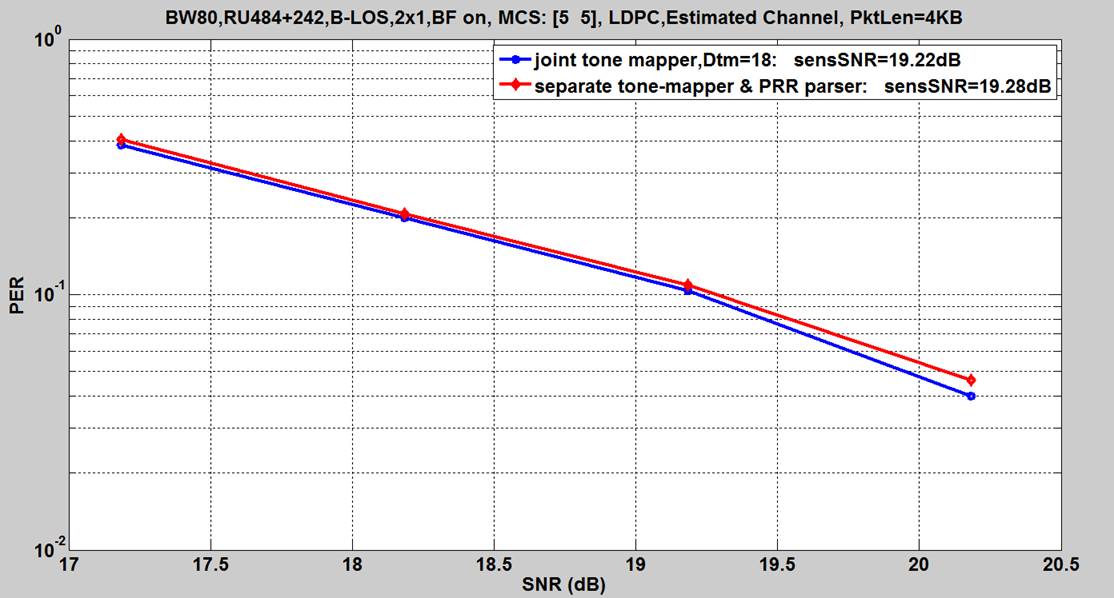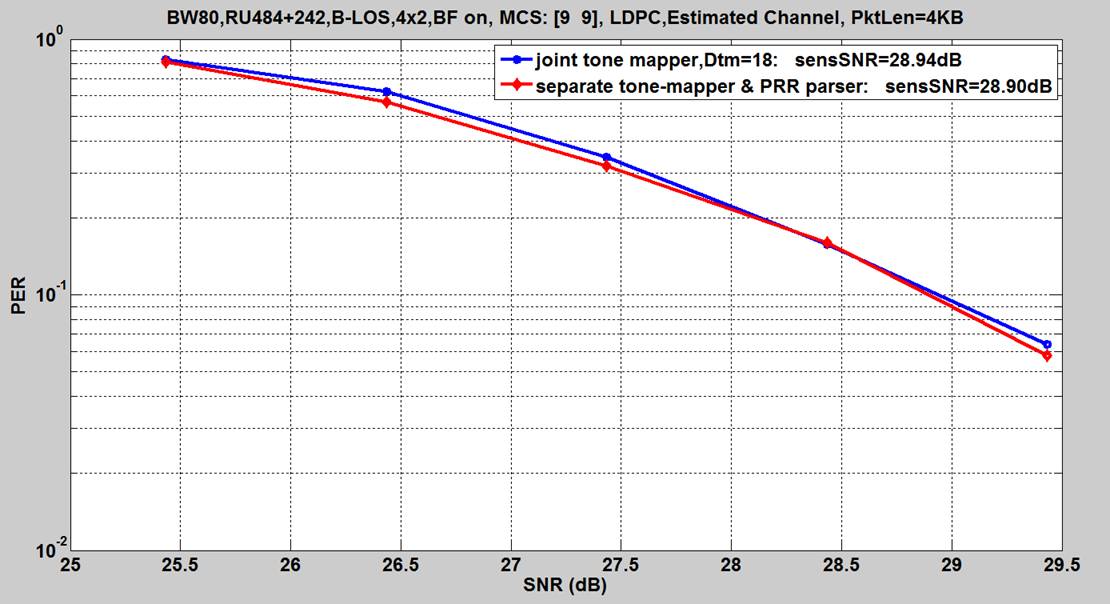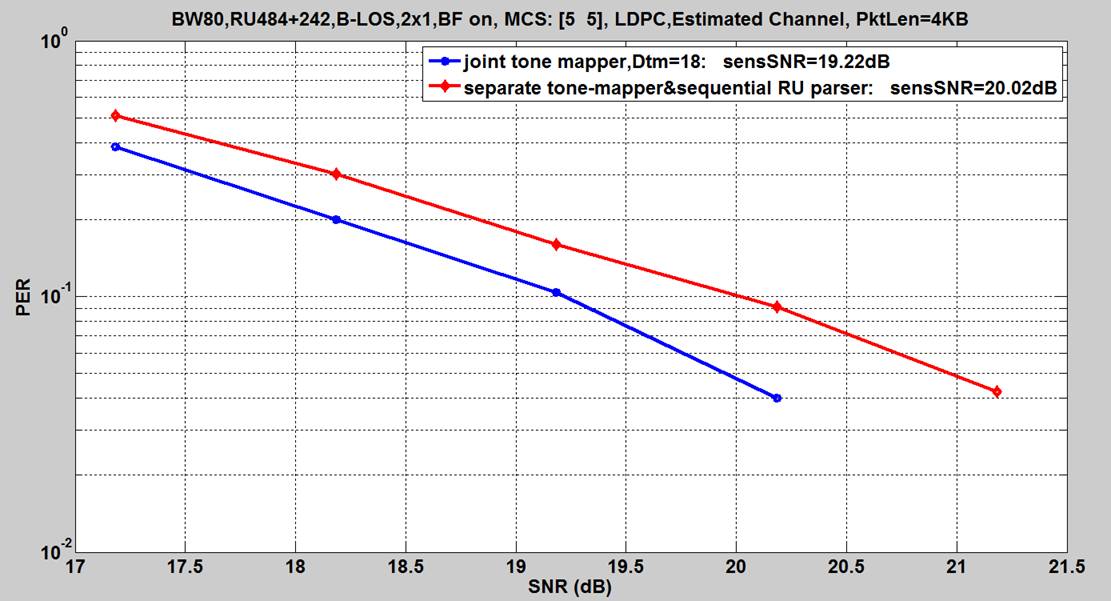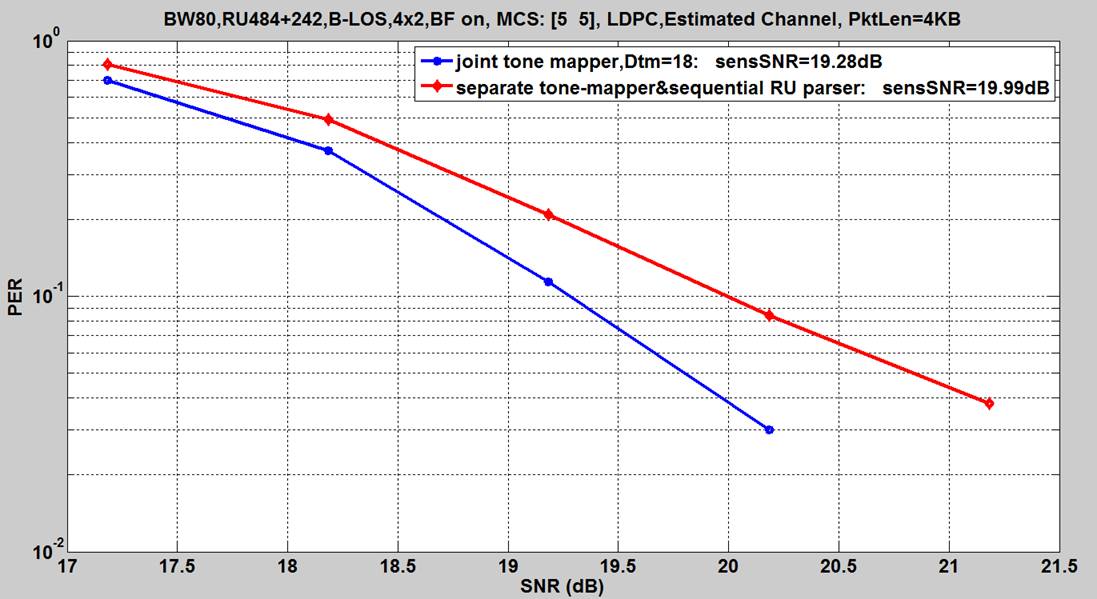Hello Jianhan,
Many thanks for your reply.
Now I see your segment parsing design for RU242+RU484+RU996, you use proportional round robin parser between (RU242+484) and RU 996, and you use sequential parsing for the aggregated RU242+484(assign all the coded bits
to the RU 242 first, after it fills up, move on to the RU 484).
The reason I asked:
1.
In your slide 7, you mentioned your proposed proportion round robin parser – ‘For any RU aggregations, taking
![]() bit-blocks (s) to RU #1, taking
bit-blocks (s) to RU #1, taking ![]() bit-blocks (s) to RU#2 alternatively according to RU-size’, I thought you need another ‘parser’ for RU242+484 for distinguishing RU242 and RU484 even with joint interleaving.
bit-blocks (s) to RU#2 alternatively according to RU-size’, I thought you need another ‘parser’ for RU242+484 for distinguishing RU242 and RU484 even with joint interleaving.
2.
And for my understanding, there is no segment parser for OFDMA, so I said that you changed the segment parser definition in 11ac and 11ax. In 11ac and 11ax, segment parser is 80MHz unit, I totally agree. But
for OFDMA in 11ax, the largest RU size is 996, for Non-OFDMA, the largest RU size is 2*996. So for both you and Bin’s contributions, I thought it was the RU parser rather than segment parser indeed. If we already changed the segment parser meaning to the RU
segment parser, why do not we use the RU parser for the large size RU directly.
Anyway, thanks again.
BR,
Dandan
发件人: Jianhan Liu [mailto:jianhanliu@xxxxxxxxx]
发送时间: 2020年4月1日
5:38
收件人: Liangdandan (2012) <dandan.liang@xxxxxxxxxx>
抄送: STDS-802-11-TGBE@xxxxxxxxxxxxxxxxx
主题: Re: [STDS-802-11-TGBE]
答复: [STDS-802-11-TGBE] 答复: [STDS-802-11-TGBE] [PHY] Segment parsing/tone mapper/interleaver for Multi-RU, 11-20/0394, 11-20/0440r1
Hi Dandan,
The tiny performance gain [0.06dB] is just the simulation variations due to randomness of channel selection and not
enough number of simulations. As what I said, joint interleave has better performance compared to sequential segment parser (which we
used for RU less than 80MHz). Joint interleave has very similar performance compared to proportional round robin (PRR) parser with smallest proportion ratios. Compared to complexity of changing the structure of per-80MHz segment parser
used in 11ac/11ax, the complexity of introducing a tone mapper is much smaller. If you insist on complexity of introducing a tone mapper, then nobody can reason with you.
Using PRR parser for 242+484 is doable, but there is no performance gain and changing the 80-MHz segment structure. That is the reason we do not using PRR for RU aggregations within one 80MHz.
I just repeat the arguments that had been said by Bin, Ron, Wook Bong and myself. Hopefully both of us can think about a little bit before we repeat ourselves again and again.
Thanks,
Jianhan
On Tue, Mar 31, 2020 at 10:07 AM Liangdandan (2012) <dandan.liang@xxxxxxxxxx> wrote:
Many thanks Jianhan.
For the low antennas scenario (2X1): compared to separated interleaving with proportional segment parsing of RU 242+484, diversity benefit of joint interleaving is quite tiny [0.06dB].
While for the more antennas scenario (4x2), separated interleaving has tiny performance gain[0.06dB] than joint interleaving.
I do not see the performance gain by adding a new tone mapper for RU242+484.
For RU242+484 [aggregated RU] scenario, if you use your proposed 80MHz segment parser, do you need another kind of parser for RU242 and RU 484 to deal with the coded bits? More specifically, how you distribute the coded bits for the non-contiguous RU242 and RU484? Do you need to distinguish RU 242 and RU 484 even with joint interleaving?
Thanks again and BR,
Dandan
发件人: Jianhan Liu [mailto:Jianhan.Liu@xxxxxxxxxxxx]
发送时间: 2020年3月31日 9:23
收件人: Liangdandan (2012) <dandan.liang@xxxxxxxxxx>; STDS-802-11-TGBE@xxxxxxxxxxxxxxxxx
主题: RE: [STDS-802-11-TGBE] 答复: [STDS-802-11-TGBE] [PHY] Segment parsing/tone mapper/interleaver for Multi-RU, 11-20/0394, 11-20/0440r1
Hi Dandan,
Please find the results of comparison joint tone mapper with proportional segment parser for 242+484. You can see the performance are almost same.
From: Jianhan Liu
Sent: Monday, March 30, 2020 5:27 PM
To: 'Liangdandan (2012)'; STDS-802-11-TGBE@xxxxxxxxxxxxxxxxx
Subject: RE: [STDS-802-11-TGBE] 答复: [STDS-802-11-TGBE] [PHY] Segment parsing/tone mapper/interleaver for Multi-RU, 11-20/0394, 11-20/0440r1
Hi Dandan,
Please see the simulation results on 242+484. You can see that joint tone interleave has better performance.
From: Liangdandan (2012) [mailto:dandan.liang@xxxxxxxxxx]
Sent: Monday, March 30, 2020 3:55 PM
To: STDS-802-11-TGBE@xxxxxxxxxxxxxxxxx
Subject: [STDS-802-11-TGBE] 答复: [STDS-802-11-TGBE] [PHY] Segment parsing/tone mapper/interleaver for Multi-RU, 11-20/0394, 11-20/0440r1
Hello Jianhan,
Many thanks for replying this email. Looking forward to your comparison results.
Jianhan, I might not explain clearly during your presentation, please let me clarify it again. For my understanding, it is RU parser rather than Segment parser in your contributions. Because in 11ac/ax, one segment (80MHz) only has one RU, so RU parser equals to Segment parser. In 11be, because one STA can be assigned to multi RUs, so here it is straightforward to use RU parser. For example for RU242+RU484+RU996, we have RU parser 20MHz, RU parser 40MHz and RU parser 80MHz,respectively. And we do not need to add new joint tone mapper for RU242+RU484 by using the RU parser definition.
BR,
Dandan
发件人: Jianhan Liu [mailto:jianhanliu@xxxxxxxxx]
发送时间: 2020年3月31日 3:09
收件人: Liangdandan (2012) <dandan.liang@xxxxxxxxxx>
抄送: STDS-802-11-TGBE@xxxxxxxxxxxxxxxxx
主题: Re: [STDS-802-11-TGBE] [PHY] Segment parsing/tone mapper/interleaver for Multi-RU, 11-20/0394, 11-20/0440r1
Hi Dandan,
Thanks for you email.
Due to outbreak of corona virus, my colleague can not access the data last week. Please give me a couple of days more, and I will send you the comparison results.
By the way, it is not straightforward for 20Mhz as unit for RU parser because in 11ac and 11ax we all use 80MHz segment parser. Also, for a 484-size RU, we use a joint tone interleaver instead of two 242 RUs interleaved separately. Same problem for a 996-size RU, e use a joint tone interleaver instead of Four 242 RUs interleaved separately.
If we follow your idea to do 20MHz parser, how about the 484 RU and 996 RU in 11ax and 11be? It is really awkward to have a 20MHz parser for other aggregated RUs but not for 484 RU and 996 RU.
Thanks,
Jianhan
On Sun, Mar 29, 2020 at 9:09 PM Liangdandan (2012) <dandan.liang@xxxxxxxxxx> wrote:
Hello PHY fans,
This is an email to discuss Segment parsing/tone mapper/interleaver for Multi-RU, 11-20/0394, 11-20/0440r1. During 3/26 PHY ad hoc conference call, I requested some simulations comparison between joint interleaver vs separated interleaver for large MRU within 80MHz.
There is a big chance to run the SPs on Monday PHY ad hoc meeting, and the topics are quite important, so I want to discuss it before running the SP through e-mail reflector.
If you are not interested in this topic, sorry for this email.
Hello Bin and Jianhan,
Thanks for your presentations about Doc ID: 20/0394r0, 20/0440r1. The topics are quite important. Could you kindly provide your mentioned simulation results comparison between the joint interleaver and separate interleaver with proportional parser for RU242+RU484, please?
As Bin mentioned in his slides deck, ”Diversity benefit from joint interleaving over 80MHz segment is minor, especially with more antennas“. Could we extend it to joint interleaving over 20MHz? If they have similar performance, why do we introduce new hardware implementation- new LDPC tone mapper?
Regarding the segment parser, agree that it is exactly for 80 MHz in 11ac/ax. However, the parser proposed in 20/0394r0, 20/0440r1, it is not exactly segment parser, actually it is RU parser, for example parser for RU484+RU996. Moreover, the number of branches of the parser is no longer 2.
Given that the basic unit of preamble puncture is 20MHz, it is straightforward to use 20Mhz as unit for RU parser in 11be like boundary discussion for MRU modes.
Now RU242+RU484 is only one case within 80MHz, but later if we have more MUR modes within 80 MHz, do we need to consider its extension? RU parser is better than joint interleaver for extension at this point.
If without new joint interleaver, we can reuse the current 11ax mechanism, and the RU parser for the case of RU242+RU484+RU996 can be solved by 1s:2s:4s as per Jianhan’s proportional round robin parsing method.
Looking forward to your reply.
Many thanks and Best regards,
Dandan
To unsubscribe from the STDS-802-11-TGBE list, click the following link: https://listserv.ieee.org/cgi-bin/wa?SUBED1=STDS-802-11-TGBE&A=1
To unsubscribe from the STDS-802-11-TGBE list, click the following link: https://listserv.ieee.org/cgi-bin/wa?SUBED1=STDS-802-11-TGBE&A=1
*********** MEDIATEK Confidentiality Notice ***********The information contained in this e-mail message (including anyattachments) may be confidential, proprietary, privileged, orotherwise exempt from disclosure under applicable laws. It isintended to be conveyed only to the designated recipient(s). Anyuse, dissemination, distribution, printing, retaining or copyingof this e-mail (including its attachments) by unintended recipient(s)is strictly prohibited and may be unlawful. If you are not anintended recipient of this e-mail, or believe that you have receivedthis e-mail in error, please notify the sender immediately(by replying to this e-mail), delete any and all copies of thise-mail (including any attachments) from your system, and do notdisclose the content of this e-mail to any other person. Thank you!
To unsubscribe from the STDS-802-11-TGBE list, click the following link: https://listserv.ieee.org/cgi-bin/wa?SUBED1=STDS-802-11-TGBE&A=1
To unsubscribe from the STDS-802-11-TGBE list, click the following link: https://listserv.ieee.org/cgi-bin/wa?SUBED1=STDS-802-11-TGBE&A=1



